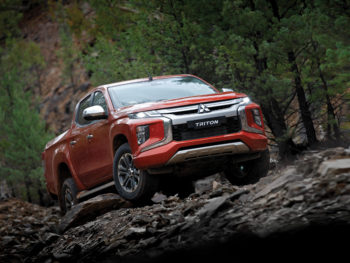With Mitsubishi set to lead pickup development for its Renault and Nissan alliance partners, Alex Grant found out how the manufacturer sees new relationships and new technology shaping the sector over the next decade.

What role does Mitsubishi play within the Alliance, and what areas will you specialise in?
Trevor Mann, chief operating officer: “Mitsubishi’s contribution to the alliance… 1m units. Without it we wouldn’t be the number one automotive group in the world. Secondly, we have expertise in PHEV, we have 4×4 expertise and we have framed vehicle expertise. So, when we look at the job shares between the alliance going forward, it’s indicated that we take the lead on framed and PHEV development.”
Does this affect Mitsubishi’s relationship supplying pickups to FCA?
Trevor Mann, chief operating officer: “We have an agreement with Fiat [Professional] at the moment, and we have had that for some time. I think generally with LCVs there tends to be a bit of OEM relationship, because generally it’s the network and the relationship between the dealer and the purchaser that’s more important than the badge. As you will see in the industry, there’s a lot of OEM deals between brands. And as long as it’s working for both parties, and as long as it’s not degredating back to the brand, because you’re not racing to the bottom with your partner, then that will continue.”
Given MitsubishI’s specialism in plug-in hybrids, when might we see this come to the L200?
Vincent Cobee, corporate vice president: “Today the pickup market is mostly driven by performance, durability, cost of ownership, toughness. The answer today is frame-based, 2.4-litre diesel, plus or minus one or two turbos, and a six-speed automatic transmission, which is what [the new L200] is giving.
“The PHEV technology today has not reached a sufficient level of cost/performance or durability demonstration to be an easy installation. But, by 2025, electrification will have to happen. We can easily convince ourselves that there might be new innovation to bring a form of electrification that answers toughness, durability, no range anxiety and proper cost of ownership.
“So I think it will migrate from the compact SUV and mid SUV segments towards heavier and tougher vehicles in five or 10 years, and if there’s one company in a good place to do this then it’s Mitsubishi. The key elements of towing, load, maintenance… can all be delivered by a PHEV.”
Would this mean the end of diesel versions?
Koichi Namiki, L200 programme director: “Diesel is very important, we can’t get rid of diesel right now. So we will upgrade the diesel engines to comply with compete with the more stringent emission and CO2 regulations.
“The pickup is also a working truck. So it has to be as inexpensive as possible. As you can imagine, diesel engines require a lot of technologies, so it’s going to become very expensive rapidly, so sometime in the future maybe an electrified vehicle will be less expensive compared to a diesel. The big question is if a customer accepts such an expensive vehicle for working.”
Could 48-volt ‘mild hybrid’ technology play a role, or will this be skipped?
Vincent Cobee: “I don’t have a perfect answer, but I would say we will skip it. What’s happening in Continental Europe might tip the equation. Pickup regulation is forcing the deal – the customer wants torque and towing capacity – fuel economy is a checkpoint but not the key driver. But France just put CO2 tax on double cabs, and when you do this you are putting pickup in the car category and tipping the thinking.
“So my assumption is we will live with diesel until Euro 7, and it will become tough between Euro 7 in 2023 and [Corporate Average Fuel Economy] requirements in 2025. That’s the window where things might tumble, and they might tumble so quickly that 48v might be skipped.”

